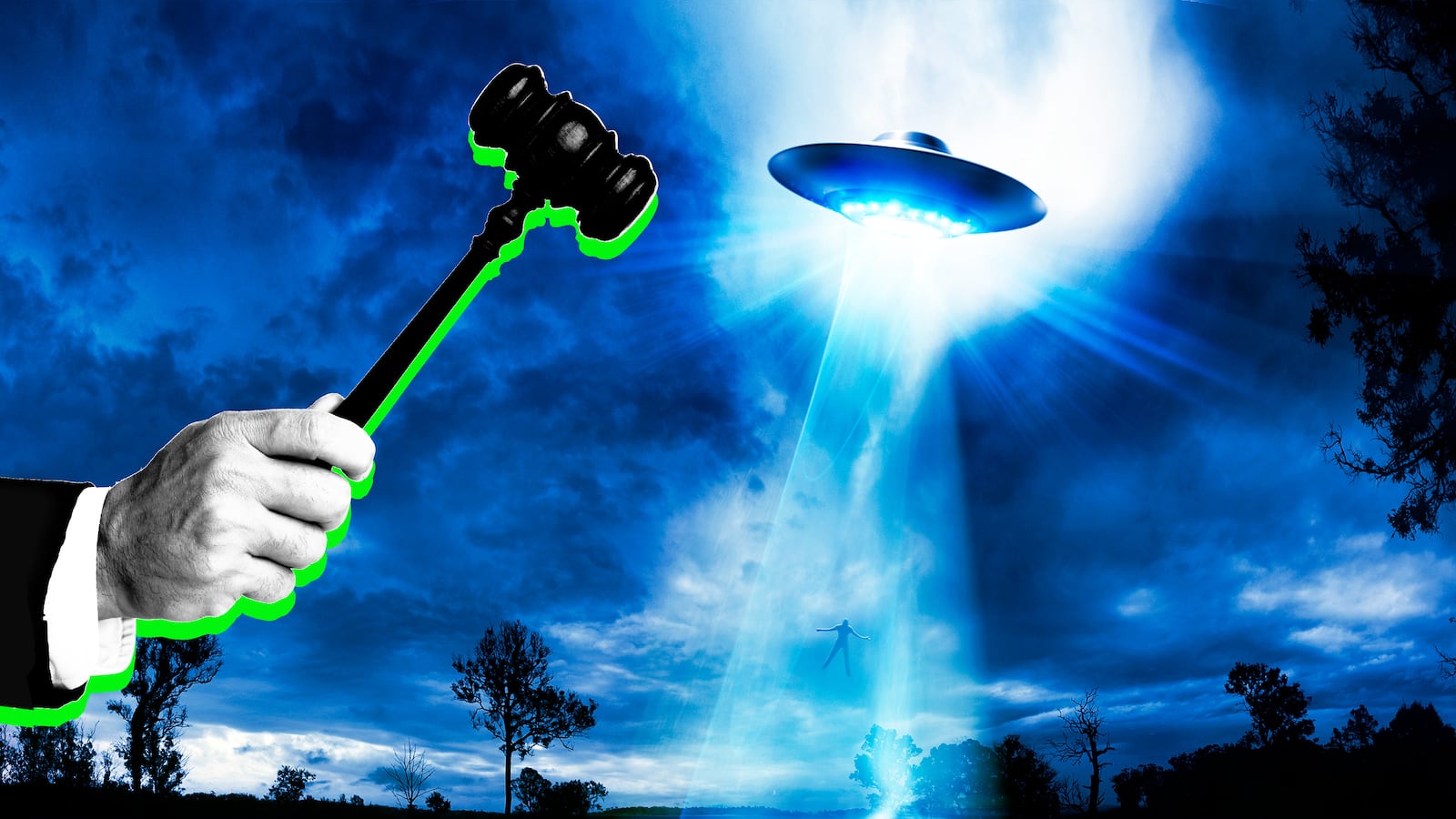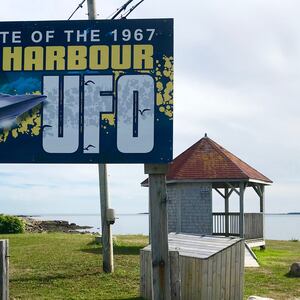The world of UFO conspiracy theorists has been torn apart by dueling lawsuits, pitting a prominent UFO influencer against a conspiracy-minded streaming video company valued at more than $200 million over who has the right to discuss their experiences with a benevolent species of blue alien.
The battle taking place in a federal courthouse in Colorado centers on Corey Goode, a UFO promoter and self-proclaimed deep-space traveler who consorts with benevolent aliens, and his former employer, Gaia, a publicly traded streaming platform whose videos blend yoga instruction with stories about “deep state” villains and benevolent aliens.
After leaving his Gaia show in 2018, Goode engaged in a long-running feud with the company. In March 2020, Goode sued Gaia, alleging that the company had engaged in an elaborate conspiracy against him. On Monday, Gaia filed a countersuit, accusing Goode of defamation and concocting various schemes to sabotage the company.
Attorneys for Goode and Gaia declined to comment.
Much of the lawsuit centers on who has the right to talk about a bird-like species of alien called “Blue Avians,” as well as a covert space agency that are, in Goode’s telling, both supposed to be real things.
That’s because Goode doesn’t just talk about aliens—he claims to have met them. In his telling, Goode was hired as an “empath” when he was 6 years old to join a group called the “Secret Space Program” on a 20-year contract dubbed “20 and Back,” in which he met friendly Blue Avians. Indeed, Goode claims that he has a close connection with the aliens, saying on his website he’s a member of the “Blue Avian soul group” brought to Earth to “help with planetary ascension.”
Goode joined Gaia in 2015, shortly before mysterious Gaia founder Jirka Rysavy spun off his hugely successful yoga equipment business, now called Gaiam, to focus exclusively on his conspiracy theory-heavy streaming channel.
Goode’s Blue Avian stories made him a popular figure in the “disclosure community,” a group of UFO enthusiasts named after their desire to see the “disclosure” of the truth about aliens. Goode co-hosted a Gaia show called Cosmic Disclosure, earned tens of thousands of dollars in speaking fees at alien-themed conferences, and has nearly 70,000 Twitter followers.
Goode also filed for trademarks on some of his key phrases, like “Secret Space Program,” “20 & Back,” and “Blue Avians”—an odd move if they actually do exist, and aren’t his own creations.
Gaia as a company was also becoming interested in the Blue Avians to a bizarre degree, according to a Business Insider report. Gaia employees working on a “documentary” about the Blue Avians claimed they were told that the extraterrestrial Blue Avians themselves would have to be involved in approving part of the film’s publicity plan, according to the report. Gaia has denied the claim.
Goode’s relationship with Gaia turned sour over what he describes in his lawsuit as abuse from a top Gaia employee he claims threatened him with a gun and pressured him to make 26 episodes of his show in a single week. Gaia, for its part, counters that Goode was getting anxious because he was running out of things to talk about. Gaia’s lawyers claim that, after quitting, Goode owes the streaming company for a $25,000 advance to appear at a conference, as well as a hefty relocation payment meant to help Goode move for his job.
Two months after Goode quit Gaia, the company replaced him with a “new insider” for viewers. UFO enthusiast Jason Rice started appearing on Gaia and claiming that he, too, had been an empath on “20 and Back” missions for the “Secret Space Program” to meet with “Blue Avians.”
Through his attorney, an incensed Goode sent Gaia a letter telling them to stop using his trademarked terms like “Blue Avian,” and essentially saying Rice did a poor job describing the aliens with “a lackluster counterfeit of Mr. Goode’s story.”
“Mr. Rice’s testimony is lacking drastically the quality and authenticity of Mr. Goode’s testimony,” Goode’s lawyer wrote in one letter to Gaia.
But according to Matthew Remski, a freelance journalist who reports on the intersection between New Age wellness culture and conspiratorial thinking, Goode should have been thrilled that someone else was confirming his alien stories—if they’re actually real.
“He should be happy that somebody else is validating the Blue Avians,” Remski, who co-hosts a podcast called “Conspirituality,” told The Daily Beast.
Gaia alleges that Goode attempted to get back at the company with a series of defamatory allegations, claiming he posed as a group of disgruntled former Gaia employees to attack the company. They also allege that Goode was involved in a scheme to accuse Gaia’s top brass of practicing “Luciferianism”—in other words, of being Satan-worshipping cannibal-pedophiles of the sort imagined in the Pizzagate conspiracy theory.
In July 2018, Goode’s Cosmic Disclosure co-host David Wilcock quit the program. In a resignation letter that was quickly leaked to UFO-themed blogs, Wilcock claimed he was furious that his show was forced to promote a Gaia program called Ancient Civilization, which he wrote was involved in “Luciferian” activities.
Wilcock wrote in his letter that the connections to “Luciferianism” meant that he could be targeted by Pizzagate conspiracy theorists.
“How would this look if it all got dragged into the public eye, especially in light of the overwhelming online movement called Pizzagate?” he wrote. “Millions of people are now working to identify Luciferian elements in our society, and they are murderously angry about it.”
Gaia claims that Goode helped produce and distribute Wilcock’s letter, in an attempt to smear Gaia executives as Satan-worshippers.
“In short, Wilcock accused Gaia and/or its employees of being Luciferians engaged in or promoting ‘pedophilia, human sacrifice, cannibalism and genocidal aspirations,’” the attorneys write in the counter-suit.
Goode had fallen prey to a phenomenon in the New Age conspiracy theory landscape that Remski calls “charismatic collapse”—the idea that a UFO influencer is only as good as the story they can tell about their experiences with aliens and similar otherworldly forces. Now that Gaia had another veteran of the “Secret Space Program,” they could move on.
“There’s so many of them,” Remski said, referring to UFO influencers. “It seems like they’d be expendable.”








